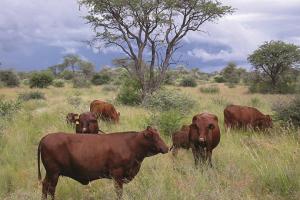Namibia’s ban on antibiotics in healthy animals drives meat exports
November 2017
Namibia was the first African nation to ban the routine use of antibiotics in its beef industry, when it passed a law 26 years ago. The thriving industry is proof that large-scale meat production can succeed without squandering one of the most precious resources of modern medicine.
Around the world, many food-producing animals (such as cattle, pigs, poultry, and fish) are given antibiotics daily to make them grow bigger, faster. They are also given to animals kept in confined conditions to prevent disease.
"The volume of antibiotics used in animals is continuing to increase worldwide, driven by a growing demand for foods of animal origin, often produced through intensive animal husbandry," says Dr Kazuaki Miyagishima, Director of the Department of Food Safety and Zoonoses at WHO. "Scientific evidence clearly demonstrates that overuse of antibiotics in animals can contribute to the emergence of antibiotic resistance.”
Namibia leads the way
In 1991, Namibia introduced a law that banned the use of hormones and antibiotics for growth promotion in the beef industry.
“We are allowed to administer antibiotics to treat bacterial disease but not for prevention, and we do it only with a prescription from a veterinarian,” says Rosa Katjivena, quality assurance executive of the Meat Corporation of Namibia.
“The health risks are our biggest concern because the overuse of antibiotics leads to the development of ‘superbugs’ [antibiotic-resistant bacteria]. Methicillin-resistant Staphylococcus aureus (MRSA), as well as some other salmonella strains, have become resistant because of the practice of overuse of antibiotics.”
New WHO guidelines
As part of work to tackle the growing threat of antibiotic resistance worldwide, WHO has launched new guidelines on use of antibiotics in food-producing animals. The aim is to help preserve the effectiveness of antibiotics important for human medicine by reducing their unnecessary use in healthy animals. Reinforcing the work of countries like Namibia, the guidelines recommend that all countries stop using antibiotics routinely for growth promotion and disease prevention in healthy animals.
WHO guidelines on use of medically important antimicrobials in food-producing animals
In Namibia, WHO is working with the government to develop a national action plan to guide all of its work in tackling antimicrobial resistance. This plan will be aligned with the Global action plan on antimicrobial resistance that was agreed by governments at the World Health Assembly in 2015.
Preventing infections
In Namibia and other countries that have stopped using antibiotics routinely for disease prevention, farmers and food producers avoid infections spreading among their animals by improving the conditions in which animals are kept.
“We focus on animal welfare and hygiene as prevention, as opposed to administering medicines to prevent disease. The animal welfare approach is definitely an advantage because the quality of the meat is much better. Everything is done calmly and systematically, reducing the stress levels in animals. If your animal is stressed, the meat is dark, not attractive to the consumer and the shelf life is much shorter,” says Ms Katjivena.
Keeping the pens clean and giving the animals more space is key, as well as ensuring they have clean water and fresh, dry feed. Vaccinating animals against infectious diseases is another safe, effective, and affordable method that can reduce the need for antibiotics.
Consumers driving market
One would think that this ban would put Namibia at a competitive disadvantage to other countries that permit antibiotics to promote growth in animals, as animals raised with antibiotics grow faster and can be slaughtered earlier. However, these concerns were quickly outweighed by increased demand for quality meat marketed as antibiotic-free.
“We actually receive a premium price in the market place. This is a main advantage that we are enjoying from the status of having banned antibiotics and hormones,” says Ms Katjivena.“Our main market is the European Union. It’s a very important market for us and they prohibit and ban antibiotic use and hormones for growth promotion, so to make it easier for ourselves we went the route of legislating it.”
In countries that do not legislate on antibiotic use for growth promotion, health-conscious consumers are driving an ever-expanding market for meat raised without antibiotics.
In 2016, Namibia became the first African country to be eligible to export its premium meat to the huge potential market of the United States of America. By 2021, the country expects to be exporting more than 5 million kilograms of meat there each year.



